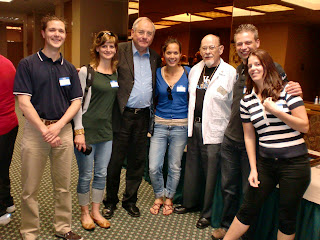Thursday morning we got a lecture by Dani Smith. She works at the Chapman University
Dani (and the Chapman University
In the end everyone just wants to tell there story. If you are a good listener and ask questions why some people think en do the things they do you have a better understanding.
The things Dani told us about the idea behind the Peace Study Program made me realize that in my field of work at Elker we already use this philosophy in the basis attitude of the social workers in our unit. It made me proud to realize we approach clients and the system in a way that is an entire field of study at the University in California
For lunch we got invited at the Rotary club meeting. We did out short presentation and were honoured to meet Bob Meyer (one of the Rotarians) who was a glider pilot during the World War 2. He participated in the operation Market Garden and was a part of the liberation of the Netherlands
 |
| Bob Meyer the third on te right |
My first vocational:
After lunch I had an appointment with a clinical social worker who gives psychotherapy for adults and adolescents. We had an interesting meeting. We shared experiences. We also compared the system in The Netherlands and in California California and the Netherlands
I’ll first start to explain the social system within the adolescents care.
You have two systems in California
People with a low income get a state insurance, a lot of people have a low income that is not low enough for state insurance, its tough for them.
Adolescents who are in the system are heavy cases, double diagnostics, orphans, criminal teens, abused and neglected children and adolescents.
To help and prevent adolescents for going to residential care or juvenile there is the community that does a lot, they have supporting family resource centres, support groups, educational seminars and classes. Those are one of the many things they have.
There is a group that is not heavy enough for the residential care but who need the attention en treatment. Here in Orange this group can visit the St Joseph
A big difference between the care in California California
Every student has his own individual plan. If a student needs more specialized education, school adapt there plan en give the student the education he needs. If there are other problems, like mental health problems, behavioural problems they adapt there individual plan and seek and guide the student with the therapy he needs. School is responsible during the entire period, they look for the right treatment, make sure the family gets the treatment they need and evaluate this treatment. Because of the responsible function, school is protected by law.
Unfortunately most care stops when the adolescents turns 18. For this age there are programs that support, by example help with finding a job, financial help, etc. April (the wife in my first host family) is finding sponsors for projects like this.
Thursday evening:
This evening we went to a baseball match. The Angels (Anaheim ) played against The Red Sox (Boston
It was a long match (4,5 hour) and unfortunately The Angels lost. It was a good experience and so much fun.
 |
| The mascot Rally Monkey |





Geen opmerkingen:
Een reactie posten